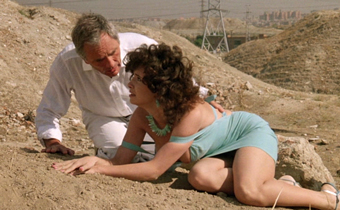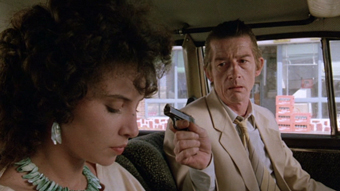
 |
|
|
|
Crime dramas don't get any better than The Hit, a brutal character study from Stephen Frears (Gumshoe, The Grifters, Dirty Pretty Things) that benefits from a superb cast. Everything clicks in this story of English gangsters in Spain, starting with Peter Prince's lean and unpretentious screenplay.
After ratting out his criminal associates on the witness stand, hoodlum Willie Parker (Terence Stamp) has spent ten years under police protection in a small town north of Madrid. That's when freelance hit man Braddock (John Hurt) shows up to take Willie to Paris, where the mob is waiting to repay him for his treachery. The pitiless Braddock is assisted by Myron, a street thug with a bad habit of talking too much (Tim Roth of Rob Roy and Pulp Fiction in his first film). In swapping out their getaway car,
The Hit is a superb British crime film, a rewarding variant on earlier noir versions of Ernest Hemingway's The Killers. Like the murder victim in the 1946 and 1964 films of that title, Willie Parker seems irrationally passive about his fate and foregoes numerous opportunities to resist or flee. This lack of concern irritates Myron, who becomes insecure when his intimidation has no effect. He's convinced that Willie's attitude is masking a clever escape plan. The film also resembles a seedy gangster riff on the celebrated Budd Boetticher - Randolph Scott westerns, a four-sided game of survival. Realizing that the foreigners intend to kill her, Maggie is frustrated when Willie just shrugs his shoulders at her suggestion of a joint escape: Willie just isn't cut out to play the Randolph Scott role. The Spanish beauty thenceforth shifts her attention to Myron. Making a mess of his first big-league job, Myron indulges in needless mayhem, brandishing a bicycle chain and other hooligan's weapons to tear up some Spanish punks at a roadside beer stand. Willie undermines Myron's sense of security by casting doubt on the competence of his boss. Myron is soon whining to Braddock that killing Maggie just isn't fair.
John Hurt's Braddock is the story's real center, a calculating mastermind who resists revealing his personal feelings. Although Braddock fully intends to fulfill his kidnap-murder assignment, it's obvious that he's also affected by the personalities around him. He begins to commit errors of judgment. Is Braddock envious of Willie's
At one point Maggie bites Braddock's hand so hard that she draws blood. Does Maggie's valorous resistance inhibit Braddock from killing her? The gangster clearly finds her bravado extraordinary. It's a subtle return to the noir convention of tough killers attracted to even tougher femmes fatale. Maggie is Braddock's kind of woman. Stephen Frears directs The Hit without undue stylistic flourishes, allowing us to concentrate on the interior states of his characters. Much of the movie is filmed in a moving car on Spanish deserts. Willie makes comments about Napoleon and Roland as they pass a chain of medieval castles, and a stop at a pair of Quixote- like windmills brings up other classic associations that comment on the sordid mission at hand. The kidnappers' bloody path is traced by the Spanish police led by the iconic Fernando Rey. An Australian thug (Bill Hunter) is threatened on the balcony of a Madrid skyscraper and an attendant tries to rescue Maggie when she calls for help at a gas station. Frears tends to withdraw from violent acts, a strategy that doesn't make them any less brutal. He covers Myron's sadistic dust-up at the beer stop in one very convincing telephoto shot. A later struggle between Maggie and Braddock is shown in a wide shot aimed straight down from a great height. The figures move like specimens on a microscope slide. 
The Hit receives high marks for innovation, occasionally transcending its own genre. Nobody behaves as expected. The doomed target maintains a philosophical detachment, the hard-boiled hit men betray weakness and the helpless female is anything but. Despite the constant threat of killing, each of the characters reveals a need for meaningful human contact. Popular actor Jim Broadbent can be briefly seen as a prosecutor questioning Willie in a courtroom prologue. Criterion's DVD of The Hit is an excellent presentation of this well remembered, under-distributed crime thriller. The handsome transfer accurately reproduces cameraman Mike Molloy's Spanish vistas of featureless deserts and hazy forests, and a solid monaural soundtrack provides a showcase for Paco de Lucia's stirring guitar score -- with a biting title track by Eric Clapton. 
Director Frears, actors John Hurt and Tim Roth, writer Peter Prince and editor Mick Audsley contribute to the commentary track. They seem genuinely pleased to discover how well their film has held up, 25 years later. Editor Audsley explains how he fashioned the opening scenes by pulling material from later in the film; we notice that the recurring song "We'll Meet Again" appears to have been added in editorial as well -- nobody is actually seen singing it on camera. Terence Stamp makes an appearance through an amusing, revealing 1988 British television show, reflecting on his career as a golden boy of the swinging sixties who dropped out a decade later. An original trailer is included, and film critic Graham Fuller provides a perceptive insert booklet essay. Fuller notes that Willie Parker is based on a real-life informer named Bertie Smalls -- the buddies he put behind bars indeed sang "We'll Meet Again" as he left the courtroom.
On a scale of Excellent, Good, Fair, and Poor,
The Hit rates:
Reviews on the Savant main site have additional credits information and are often updated and annotated with reader input and graphics. Also, don't forget the 2009 Savant Wish List. T'was Ever Thus.
Review Staff | About DVD Talk | Newsletter Subscribe | Join DVD Talk Forum |
| ||||||||||||||||||